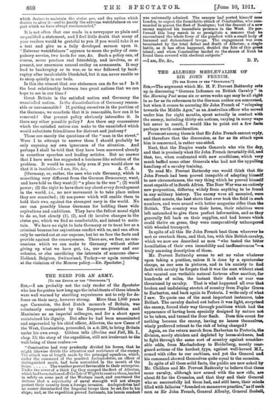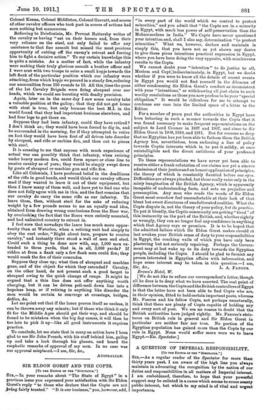THE ALLEGED MEDI2EVALISM OF SIR JOHN FRENCH.
[To ma EuaoR OP THE firscrtroa."1 Sin,—The argument which Mr. H. F. Prevost Battersby sets up in discussing "German Influence on British Cavalry" in the Morning Post some six or seven weeks ago may be all right in so far as its references to the German author are concerned, but when it comes to accusing Sir John French of "relapsing towards the Middle Ages," as an Australian officer who served under him for eight months, spent actually in contact with the enemy, including thirty-six actions, varying in many ways but never in result, I would like to point out a few fade perhaps vforth consideration.
Foremost among these is that Sir John French cannot reply, and therefore that the discussion, as far as its attack upon him is concerned, is rather one-sided.
Next, that the Empire wants Generals who win the day, and that is precisely what Sir John French invariably did, and that, too, when confronted with new conditions, which very much baffled some other Generals who had not the appalling handicap of a cavalry training.
To read Mr. Prevost Battersby one would think that Sir John French had been proved incapable of adapting himself to new circumstances, the very thing which he proved himself most capable of in South Africa. The Boer War was an entirely new proposition, differing widely from anything to be found in any military history. The enemy were all mounted, were excellent scouts, the beet shots that ever took the field in such numbers, and were armed with better magazine rifles than the British. The country was their home, their relatives were left untouched to give them perfect information, and as they generally fell back on their supplies, and had horses which could thrive on grass, they were comparatively unhampered with wheeled transport.
In spite of all this Sir John French beat them wherever he met or overtook them, and that, too, with this British cavalry, which we now see described as men "who tasted the bitter humiliation of their own immobility and inoffensiveness" a truly amusing description of them.
Mr. Prevost Battersby seems to set no value whatever upon taking a position, unless it is done by a spectacular charge, as one sees in pictures, and in his anxiety to find fault with cavalry he forgets that it was the men without steel who vacated one veritable natural fortress after another, for hundreds of miles, the instant their flank or rear was threatened by cavalry. That is what happened all over that broken and undulating stretch of country from Poplar Grove to Barberton, and back again to Pretoria. I write only of what I saw. To quote one of the most important instances, take Belfast. The cavalry dashed out before it was light, surprised the enemy, forced their way through positions which had the appearance of having been specially designed by nature not to be taken, and turned the Boer flank. Does this count for nothing because the enemy, having no lances themselves, wisely preferred retreat to the risk of being charged?
Again, on the return march from Barberton to Pretoria, the division, sorely stricken and depleted by horse-sickness, had to fight through the same sort of country against consider- able odds, from Machadodorp to Heidelberg, mostly rear. guard actions of the hardest _type, against well-horsed MI., armed with rifles to our carbines, and yet the General and his command showed themselves quite equal to the occasion.
In spite of all these solid facts, the public are now asked by Mr. Childers and Mr. Prevost Battersby to believe that these same cavalry, although now armed with the new rifle, are about fit for the Crusades, and that they said their General who so successfully led them had, and still have, their minds filled with fallacies "founded on manoeuvre practice," as if such men as Sir John French, General Allenby, General Scobell,
Colonel Kenna, Colonel Middleton, Cotonal Garratt, and scores of other cavalry officers who took part in scores of actions had seen nothing but rnanceuvres.
Referring to Driefontein, Mr. Prevost Battersby writes of the cavalry as having "sat on their horses and, from their very reliance on the steel, not only failed to offer any tssistance to that fine assault but missed the most precious opportunity of cutting off the enemy's retreat and forcing him to fight a decisive action." To my certain knowledge this is quite a mistake. As a matter of fact, while the infantry were making their truly glorious assault a brother officer and I were sent with two troops to seize a small kopje towards the left flank of the particular position which our infantry were attacking, from which kopje we poured in a steady fire, reducing our ammunition from 150 rounds to 10. All this time the guns of the 1st Cavalry Brigade were firing shrapnel over our heads, which we could see bursting with deadly precision.
Again, later on in the same day I saw some cavalry take a valuable position at the gallop ; that they did not get home with steel is true, but only because the best M.I. in the world found that they had important business elsewhere, and had four legs to get there on.
Suppose they had been infantry, could they have retired ? I don't think so ; they would have been forced to dig in, and be surrounded in the morning, for if they attempted to retire on foot they would have been first of all driven into disorder by shrapnel, and rifle or carbine fire, and then cut to pieces with steel.
It is amazing to me that anyone with much experience of actual war can possibly think that infantry, when retiring under heavy modern fire, could form square or close line to receive cavalry as of yore ; they would be simply swept down by gusts of shrapnel or machine gun and rifle fire.
Like all Colonials, I have profound belief in the deadliness a the rifle in good hands, and would think our cavalry officers mad if they wanted to leave it out of their equipment, but then I know many of them well, and have yet to find one who does not fully agree with me in this, and the fact remains that our cavalry do carry the same rifle as our infantry. To leave them, then, without steel for the sake of reducing weight by a few pounds seems to me an equally mad idea, obtained from drawing wrong conclusions from the Boer war, by overlooking the fact that the Boers were entirely mounted, and had unlimited country to retreat in.
I feel sure that nowadays the lance has much more oppor- tunity than at Waterloo, when a retiring unit had simply to obey the curt order, "Right about turn, prepare to receive cavalry," and instantly there stood a wall of men and steeL Could such a thing be done now with, say, 1,000 men ex- tended to three yards, that is, in all, 3,000 yards ? If ridden at from a flank only a few flank men could fire; they would mask the fire of their comrades.
Suppose they close up; what then of shrapnel and machine guns, and of the object for which they extended? Cavalry, on the other hand, do not present such a good target to shrapnel owing to the quick change of range. It might be argued that a thin line does not offer anything worth charging, but it can be driven pell-mell down line into a hopeless heap, or if retiring in anything like disorder the men would be certain to converge at crossings, bridges, defiles, &c.
Let me point out that if the lance proves itself so useless, it can be thrown away any minute ; but if those who think it only fit for the Middle Ages should get their way, and should be found to be mistaken when the big day comes, it will then be too late to pick it up—like all good instruments it requires practice.
To conclude, let me state that in many an action have I been glad to see Sir John French, with his staff behind him, gallop up and take a look through his glasses, and heard the emphatic remarks of approval of my men. In no case was our approval ruisplaced.—I am, Sir, &c.,
AUSTRALIAN.











































 Previous page
Previous page